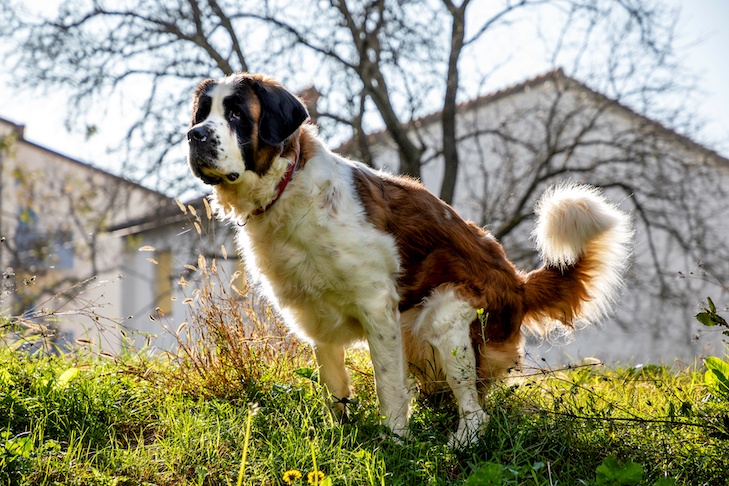If you’re a dog owner, you probably spend a lot of time dealing with dog poop. Not only do you need to pick up after your dog on your walks, but chances are you also spend time thinking about how consistent and regular your dog’s poop is. But how often should dogs do their business? And if your dog hasn’t pooped in a little while, should you be concerned?
How Frequently Do Dogs Poop?
If you have multiple dogs, you might notice that each of your dogs poops slightly different amounts and with different frequencies. Dr. Jerry Klein, DVM, Chief Veterinary Officer for the American Kennel Club, explains that “normal defecation of an adult dog depends on the type of food and frequency of feeding.”

With that in mind, he advises that in general “defecating one to two times daily is considered normal.” He also notes that if your dog is eating a diet that is higher in fiber, they may regularly poop three times a day.
Keeping track of your dog’s poop schedule can be an important way to monitor health. If you notice changes in the consistency or color of your dog’s poop or in the frequency of their pooping, share that information with your veterinarian.
Puppies also have a different poop schedule than adult dogs. “Puppies go more often, often following a meal,” explained Dr. Klein. This is why it’s important when potty training to make sure to take your puppy out frequently, especially after they eat.
Monitoring Your Dog’s Pooping Habits
If you and your dog live in an apartment, you are probably familiar with their bathroom routine, as you’re walking and every time your pet needs to go. For people with fenced yards who allow their dogs to go into the yard alone, it can be more difficult to keep track of your dog’s schedule.
Consider going out into the yard with your dog each time you let them out. This allows you to keep track of how frequently your dog is pooping.
How Long Can a Dog Go Without Pooping? What if My Dog Isn’t Pooping?
Regular pooping is important, but sometimes a dog can have slight changes in frequency. “No bowel movement in over 24 to 36 hours is a cause of concern,” explains Dr. Klein.
If you notice that your dog is nearing the 24- to 36-hour mark without doing their business, it’s a good idea to call the veterinarian. The same applies if your dog is “lethargic, vomiting, or straining to defecate, or if there is any blood when trying to defecate,” adds Dr. Klein.

How to Tell if a Dog has Intestinal Blockage
If your dog has been unable to poop, one cause could be an intestinal blockage or obstruction, where a dog’s stomach or intestines become completely or partially blocked. This blockage prevents the movement of liquids or solids through your dog’s gastrointestinal tract. Blockages are considered veterinary emergencies and may require surgical intervention.
Blockages are often caused by a dog eating something that isn’t digestible. Symptoms of obstructions to watch for include vomiting, weakness, loss of appetite, dehydration, bloating and abdominal pain, diarrhea, or conversely, an inability to poop (possible constipation). If you suspect your dog might have a blockage, contact your veterinarian or head immediately to an emergency veterinary clinic.
This article is intended solely as general guidance, and does not constitute health or other professional advice. Individual situations and applicable laws vary by jurisdiction, and you are encouraged to obtain appropriate advice from qualified professionals in the applicable jurisdictions. We make no representations or warranties concerning any course of action taken by any person following or otherwise using the information offered or provided in this article, including any such information associated with and provided in connection with third-party products, and we will not be liable for any direct, indirect, consequential, special, exemplary or other damages that may result, including but not limited to economic loss, injury, illness or death.
